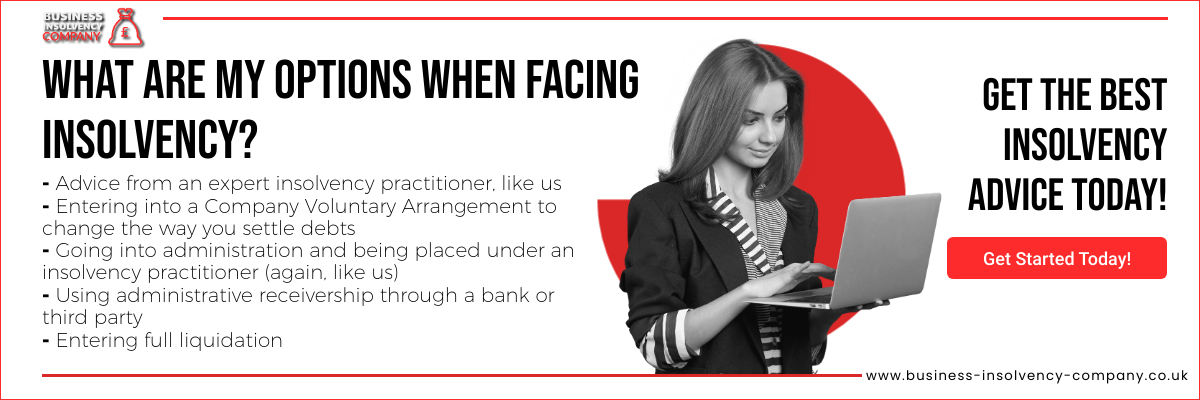20+ Years Experience
Specialist Business Insolvency Company

Get in Touch Today to Speak to a Specialist Adviser
A company facing insolvency isn’t merely dealing with financial challenges; depending on the severity of its financial distress, it could be on the brink of collapse.
As the Business Insolvency Company, we’ve supported thousands of businesses in Tilbury Essex through the insolvency process, offering initial consultations and advice to guide you through formal insolvency procedures.
Our team of licenced insolvency practitioners provides essential support to help prevent liquidation and develop structured debt relief strategies to stabilise your company.
Whether you’re struggling to manage bounce-back loans or other debts, our professional insolvency specialists in Tilbury can deliver immediate guidance. Our free consultations help businesses in the early stages of financial distress identify the best recovery strategies.
Our professional company insolvency specialists offer immediate advice and support in Tilbury and free consultation to assess the best course of action in the early stages.
If your company is experiencing financial issues, engaging a certified insolvency practitioner (IP) is critical, especially if you face a formal insolvency process like liquidation. Our team is qualified in accountancy and insolvency and is authorised to undertake all formal insolvency appointments in the UK.
Not all financial challenges signify insolvency. Sometimes, short-term cash flow issues can be resolved without full insolvency procedures. If you’re dealing with financial difficulties, assessing your company’s financial status can help you determine the appropriate next steps.
Our insolvency experts provide reliable support across Tilbury RM18 8 and are committed to assisting you with any questions about business recovery.
An insolvency practitioner (IP) is a financial recovery expert who manages various insolvency processes to assist companies and individuals in financial distress.
Licensed under the Insolvency Act 1986, an insolvency practitioner initiates Creditors’ Voluntary Liquidation (CVL), conducts company asset valuations, and facilitates debt restructuring.
Insolvency practitioners help prevent liquidation when possible, manage asset sales if necessary, and distribute proceeds equitably among creditors.
IPs offer tailored advice and support recovery efforts, aiming to restore financial stability where feasible.
An insolvency practitioner manages the insolvency processes of businesses or individuals, ensuring that financial and legal obligations are met, assets are evaluated or liquidated appropriately, and creditors’ interests are considered.
An IPs responsibilities involve various tasks, from conducting initial consultations to overseeing final financial reporting and legal documentation submission.
The key responsibilities of an insolvency Practitioner are:
Our team of licensed insolvency practitioners in Tilbury offers trusted guidance for businesses facing financial challenges.
Business Insolvency Company provides essential information to help owners manage and overcome insolvency stress.
Speak directly with an insolvency practitioner who brings valuable experience in creditor negotiations, debt restructuring, and formal insolvency processes.
Signs of potential insolvency include creditors demanding payments, increased interest rates and poor cash flow. Key indicators of insolvency include:
The signs of insolvency suggest escalating financial distress, which can impact company stability. Directors should closely monitor these warning signs to act before insolvency risks grow.

The cost of hiring an insolvency practitioner (IP) costs generally range from £1,000 to £5,000.
The fees depend on whether the IP charges a fixed fee or an hourly rate, the case’s complexity, experience, and the business’s location. A
fter the appointment, fees vary, either as a set amount, an hourly rate (often around £300), or a percentage of assets, which can be up to 15%.
Case type significantly impacts costs. A straightforward Creditors’ Voluntary Liquidation (CVL) typically costs around £5,000, while a more complex Members’ Voluntary Liquidation (MVL) may cost closer to £3,995.
More time-intensive cases, like Company Voluntary Arrangements (CVAs) or administration, generally cost more, often starting at £7,000 due to ongoing management requirements.
IPs also charge for disbursements, which cover additional expenses like legal fees, advertising, and room hire, commonly adding £500-£2,000 to the total cost. Payment for IP fees generally comes from the company’s assets. If no available assets exist, the IP may request third-party funds to cover the costs.
If you’re facing insolvency, your main options include seeking professional advice, restructuring debt, entering administration, or liquidating the business entirely.
When facing insolvency, acting carefully is crucial to avoid increasing personal and business risks.
Continuing to trade while insolvent can worsen financial and legal exposure. Instead, several structured options can help manage debt and protect your interests.
At Business Insolvency Company, we can assist you with the best specifications, costs and prices.
Contact us today for several specialist business insolvency services in Tilbury.

The process for appointing an insolvency practitioner requires that the company verifies the practitioner’s qualifications and follows specific steps to formalise the appointment. Companies must ensure the practitioner holds the necessary licences and meets regulatory standards to handle insolvency cases.
The appointment process generally starts with an initial consultation, where the insolvency practitioner reviews the company’s financial position. If the company decides to proceed, a formal appointment is then made to engage the practitioner in managing the insolvency.
This formalisation allows the insolvency practitioner to begin work on financial assessments and creditor communications as required by law.
In the UK, insolvency practitioners must pass the Joint Insolvency Examination Board (JIEB) exams, which are necessary to demonstrate their competence in insolvency matters.
A licence from a recognised regulatory body, such as the Insolvency Practitioners Association (IPA), is required to legally practise as an insolvency practitioner.
Many qualified insolvency practitioners have a background in accountancy or law, which provides a strong foundation for managing financial and legal insolvency issues.
Insolvency practitioners in the UK must uphold regulatory standards set by oversight bodies to retain their licences and maintain professional standing.
The steps to appoint an insolvency practitioner is as follows:
Businesses in Tilbury can find reputable insolvency practitioners by consulting the Insolvency Service registry, which provides a list of licensed professionals. Referrals from trusted financial advisors, accountants, or legal professionals are also valuable for identifying reliable insolvency practitioners.
Regulatory bodies such as the Insolvency Practitioners Association (IPA) ensure that licensed insolvency practitioners meet professional standards, which offers companies in Tilbury confidence in their compliance and accountability.
Aside from unsecured creditors, most creditors will have a solid claim towards your company.
When your company is experiencing temporary financial difficulties, you may end up insolvent and have to give up other assets to cover the debts.
A court judgement, a statutory demand, or a company wind-up are all ways a creditor may take legal action against you.
A wind-up is generally the worst option: it freezes accounts, sells off assets, and then fires employees unless the creditor specifically buys the company to keep it operating.
You can sometimes apply to the court to make a winding-up order halt or delay, but legally binding agreements still have to be met.
If you contractually promised a company to return something if you failed to pay for it, your company may have to meet that arrangement even while insolvent.
As a director or manager in a company, you may think that it is not your responsibility to cover any insolvency issues yourself.
However, if the insolvency could have been your fault, you might have to face some consequences for your actions.
When you are accused of wrongful trading (trading while insolvent), your trade creditors can also take action against you.
Depending on the severity of the station, you could be fined, removed from your position, expected to pay back the missing funds, or even jailed.
If you are worried about preferential creditors coming to get money from you, then you should speak to some of our experts today. Every situation is different, and your finances might be on the line.
An insolvency practitioner manages multiple procedures, from Creditors’ Voluntary Liquidation (CVL) to administration, all tailored to the company’s financial circumstances.
We can also help with individual voluntary arrangements (IVAs), which help you pay creditors. An IVA allows someone who owes money to enter an arrangement to make manageable payments.
As a licenced IP, we can help with all recovery options and provide advice accordingly.
A CVL is a voluntary process initiated by an insolvent company, managed by an insolvency practitioner who assesses assets, oversees liquidation, and distributes proceeds to creditors equitably. This approach allows the company to close operations in an orderly, often avoiding compulsory liquidation by court order.
Administration aims to protect a company’s assets and employees by allowing it to operate under the oversight of an insolvency practitioner.
The insolvency practitioner assesses whether restructuring or asset sales could repay debts.
Administration differs from liquidation, where the sole focus is closing the business and selling its assets to repay creditors.
A pre-pack administration involves planning a business sale before administration is formalised, allowing for a swift transfer of assets or operations to a buyer. This method preserves company value, protects jobs, and is often used when there is an interested buyer, making it suitable for businesses needing fast action to secure assets.
A CVA is a formal agreement between a company and its creditors, allowing debt repayment over time. A CVA enables businesses to continue trading under new financial terms, provided creditors agree to the arrangement, which the appointed insolvency practitioner manages.
An MVL is a liquidation process for solvent companies where assets exceed liabilities, allowing shareholders to close the business and receive distributed assets. The insolvency practitioner executes the process, conducting valuations, managing asset sales, and distributing funds equitably among shareholders.
The UK Insolvency Service is the main regulatory body, ensuring that insolvency practitioners comply with Insolvency Act 1986 regulations.
Insolvency Practitioners must be licenced by an approved professional body, such as the IPA (Insolvency Practitioners Association), which ensures practitioners meet stringent ethical and professional standards.
Regulatory bodies audit practitioner activities, monitor complaints, and revoke licenses if practitioners breach guidelines, ensuring that each IP operates with accountability and professional integrity.
When a company enters administration in the UK, all contracts with staff become void.
Employees will be owed any wages earned until the day of administration and may be able to claim further redundancy payments.
We discuss what happens to staff when a company goes into administration here.
You can close a company with debt to HMRC in the UK.
However, the debt owed to HMRC will still need to be settled, regardless of the company being closed. This may involve selling assets, or a director’s guarantee, to pay the debt.
It’s important to follow proper legal procedures and requirements when closing a company, including informing relevant authorities and paying outstanding debts. It’s recommended that you seek professional advice to ensure the process is handled correctly.
Make sure you contact us today for a number of great Business Insolvency services in East of England.
Here are some towns we cover near Tilbury.
Gravesend, Northfleet, Grays, Swanscombe, Stanford-le-HopeWe absolutely love the service provided. Their approach is really friendly but professional. We went out to five different companies and found Business Insolvency Company to be value for money and their service was by far the best. Thank you for your really awesome work, we will definitely be returning!
Reuben AdamsWe have used Business Insolvency Company for many years as they are certainly the best in the UK. The attention to detail and professional setup is what makes this company our go-to company for all our work. I highly recommend the team for the immense work - we highly recommend them!
Louis RobertsonFor more information on Business Insolvency services in Tilbury, fill in the contact form below to receive a free quote today.
We Aim To Reply To All Enquiries With-in 24-Hours